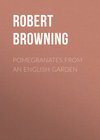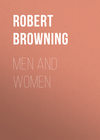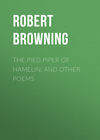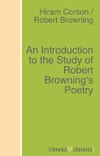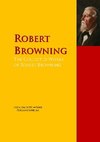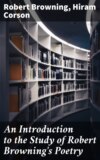Читать книгу: «Pomegranates from an English Garden», страница 5
SAUL
[The three selections which fill up the rest of this little volume are given as specimens of the distinctively Christian poems of our author. The first gives us Christ in the Old Testament; the second, Christ in the New; the third, Christianity in its essential truth and practical application. As only a portion of “Saul” can be given, a few words will be necessary to prepare the reader unacquainted with the whole for taking up the thread at the 14th stanza, from which, in the selection, the poem is continued uninterruptedly to the end.]
Young David is telling over to himself (see “my voice to my heart,” in stanza 14) the story of his mission to Saul, when, as an inspired poet-musician, he charmed the evil spirit away from him. Stanza 16, consisting of one line, is the hinge of the entire poem; for David has just reached the point where, after several unsuccessful, or very partially successful, attempts – first, by playing one and another and another tune, which might awaken some chord in the apathetic spirit of the king, and then by singing, accompanied by the harp, first, of the joy of life, then of the splendid results of a royal life like Saul’s in the great future of the world – he at last, the truth coming upon him, strikes the high key where full relief is found. As he approaches this crisis in the tale, he cannot go on without an earnest invocation for help to tell what he had been so wonderfully led to sing: —
XIV
And behold while I sang … but O Thou who didst grant me, that day,
And, before it, not seldom hast granted thy help to essay,
Carry on and complete an adventure, – my shield and my sword
In that act where my soul was thy servant, thy word was my word, —
Still help me, who then at the summit of human endeavour
And scaling the highest, man’s thought could, gazed hopeless as ever
On the new stretch of heaven above me – till, mighty to save,
Just one lift of thy hand cleared that distance – God’s throne from man’s grave!
Let me tell out my tale to its ending – my voice to my heart
Which scarce dares believe in what marvels last night I took part,
As this morning I gather the fragments, alone with my sheep!
And fear lest the terrible glory evanish like sleep,
For I wake in the grey dewy covert, while Hebron upheaves
Dawn struggling with night on his shoulder, and Kidron retrieves
Slow the damage of yesterday’s sunshine.
XV
I say then, – my song
While I sang thus, assuring the monarch, and, ever more strong,
Made a proffer of good to console him – he slowly resumed
His old motions and habitudes kingly. The right hand replumed
His black locks to their wonted composure, adjusted the swathes
Of his turban, and see – the huge sweat that his countenance bathes,
He wipes off with the robe; and he girds now his loins as of yore,
And feels slow for the armlets of price, with the clasp set before.
He is Saul, ye remember in glory, – ere error had bent
The broad brow from the daily communion; and still, though much spent
Be the life and the bearing that front you, the same, God did choose,
To receive what a man may waste, desecrate, never quite lose.
So sank he along by the tent-prop, still, stayed by the pile
Of his armour and war-cloak and garments, he leaned there awhile,
And sat out my singing, – one arm round the tent-prop, to raise
His bent head, and the other hung slack – till I touched on the praise
I foresaw from all men in all time, to the man patient there;
And thus ended, the harp falling forward. Then first I was ’ware
That he sat, as I say, with my head just above his vast knees
Which were thrust out on each side around me, like oak roots which please
To encircle a lamb when it slumbers. I looked up to know
If the best I could do had brought solace: he spoke not, but slow
Lifted up the hand slack at his side, till he laid it with care
Soft and grave, but in mild settled will, on my brow: thro’ my hair
The large fingers were pushed, and he bent back my head, with kind power —
All my face back, intent to peruse it, as men do a flower.
Thus held he me there with his great eyes that scrutinized mine —
And oh, all my heart how it loved him! but where was the sign?
I yearned – “Could I help thee, my father, inventing a bliss,
“I would add, to that life of the past, both the future and this;
“I would give thee new life altogether, as good, ages hence,
“As this moment, – had love but the warrant, love’s heart to dispense!”
XVI
Then the truth came upon me. No harp more – no song more! outbroke —
XVII
“I have gone the whole round of creation: I saw and I spoke;
“I, a work of God’s hand for that purpose, received in my brain
“And pronounced on the rest of his handwork – returned him again
“His creation’s approval or censure: I spoke as I saw,
“Reported, as man may of God’s work – all’s love, yet all’s law.
“Now I lay down the judgeship he lent me. Each faculty tasked
“To perceive him has gained an abyss, where a dew-drop was asked.
“Have I knowledge? confounded it shrivels at Wisdom laid bare.
“Have I forethought? how purblind, how blank, to the Infinite Care!
“Do I task any faculty highest, to image success?
“I but open my eyes, – and perfection, no more and no less,
“In the kind I imagined, full-fronts me, and God is seen God
“In the star, in the stone, in the flesh, in the soul and the clod.
“And thus looking within and around me, I ever renew
“(With that stoop of the soul which in bending upraises it too)
“The submission of man’s nothing-perfect to God’s all-complete,
“As by each new obeisance in spirit, I climb to his feet.
“Yet with all this abounding experience, this deity known,
“I shall dare to discover some province, some gift of my own.
“There’s a faculty pleasant to exercise, hard to hood-wink,
“I am fain to keep still in abeyance, (I laugh as I think)
“Lest, insisting to claim and parade in it, wot ye, I worst
“E’en the Giver in one gift. – Behold, I could love if I durst!
“But I sink the pretension as fearing a man may o’ertake
“God’s own speed in the one way of love: I abstain for love’s sake.
– “What, my soul? see thus far and no farther? when doors great and small,
“Nine-and-ninety flew ope at our touch, should the hundredth appal?
“In the least things have faith, yet distrust in the greatest of all?
“Do I find love so full in my nature, God’s ultimate gift,
“That I doubt his own love can compete with it? Here, the parts shift?
“Here, the creature surpass the Creator, – the end what began?
“Would I fain in my impotent yearning do all for this man,
“And dare doubt he alone shall not help him, who yet alone can?
“Would it ever have entered my mind, the bare will, much less power,
“To bestow on this Saul what I sang of, the marvellous dower
“Of the life he was gifted and filled with? to make such a soul,
“Such a body, and then such an earth for insphering the whole?
“And doth it not enter my mind (as my warm tears attest),
“These good things being given, to go on, and give one more, the best?
“Ay, to save and redeem and restore him, maintain at the height
“This perfection, – succeed, with life’s dayspring, death’s minute of night:
“Interpose at the difficult minute, snatch Saul, the mistake,
“Saul, the failure, the ruin he seems now, – and bid him awake
“From the dream, the probation, the prelude, to find himself set
“Clear and safe in new light and new life, – a new harmony yet
“To be run and continued, and ended – who knows? – or endure!
“The man taught enough by life’s dream, of the rest to make sure;
“By the pain-throb, triumphantly winning intensified bliss,
“And the next world’s reward and repose, by the struggles in this.
XVIII
“I believe it! ’Tis thou, God, that givest, ’tis I who receive:
“In the first is the last, in thy will is my powder to believe.
“All’s one gift: thou canst grant it, moreover, as prompt to my prayer,
“As I breathe out this breath, as I open these arms to the air.
“From thy will, stream the worlds, life and nature, thy dread Sabaoth:
“I will? – the mere atoms despise me! Why am I not loth
“To look that, even that in the face too? Why is it I dare
“Think but lightly of such impuissance? What stops my despair?
“This; – ’tis not what man Does which exalts him, but what man Would do!
“See the King – I would help him, but cannot, the wishes fall through.
“Could I wrestle to raise him from sorrow, grow poor to enrich,
“To fill up his life, starve my own out, I would – knowing which,
“I know that my service is perfect. Oh, speak through me now!
“Would I suffer for him that I love? So wouldst thou – so wilt thou!
“So shall crown thee the topmost, ineffablest, uttermost crown —
“And thy love fill infinitude wholly, nor leave up nor down
“One spot for the creature to stand in! It is by no breath,
“Turn of eye, wave of hand, that salvation joins issue with death!
“As thy love is discovered almighty, almighty be proved
“Thy power, that exists with and for it, of being beloved!
“He who did most shall bear most; the strongest shall stand the most weak.
“’Tis the weakness in strength that I cry for! my flesh that I seek
“In the Godhead! I seek and I find it. O Saul, it shall be
“A Face like my face that receives thee; a Man like to me,
“Thou shalt love and be loved by, for ever: a Hand like this hand
“Shall throw open the gates of new life to thee! See the Christ stand!”
XIX
I know not too well how I found my way home in the night.
There were witnesses, cohorts about me, to left and to right,
Angels, powers, the unuttered, unseen, the alive, the aware:
I repressed, I got through them as hardly, as strugglingly there,
As a runner beset by the populace famished for news —
Life or death. The whole earth was awakened, hell loosed with her crews;
And the stars of night beat with emotion, and tingled and shot
Out in fire the strong pain of pent knowledge: but I fainted not,
For the Hand still impelled me at once and supported, suppressed
All the tumult, and quenched it with quiet, and holy behest,
Till the rapture was shut in itself, and the earth sank to rest.
Anon at the dawn, all that trouble had withered from earth —
Not so much, but I saw it die out in the day’s tender birth;
In the gathered intensity brought to the grey of the hills;
In the shuddering forests’ held breath; in the sudden wind-thrills;
In the startled wild beasts that bore off, each with eye sidling still,
Though averted with wonder and dread; in the birds stiff and chill
That rose heavily as I approached them, made stupid with awe:
E’en the serpent that slid away silent – he felt the new law.
The same stared in the white humid faces upturned by the flowers;
The same worked in the heart of the cedar and moved the vine-bowers:
And the little brooks witnessing murmured, persistent and low,
With their obstinate, all but hushed voices – “E’en so, it is so!”
Stanza 14.– Observe the meeting of the human and divine in the poet-prophet’s inspiration. As poet, his powers were in their fullest exercise, and still there was an unfathomable heaven of the unknown above him, till “one lift of Thy hand cleared that distance.”
The close of this stanza sets before us the scene of the writing of this reminiscence.
Stanza 15.– The soothing influence of the singing begins to appear. Be sure to keep in mind the picture, so wonderfully illustrated, of the attitude of the two; and mark the words of David, “All my heart how it loved him,” connecting them carefully with the next stanza (16), “Then the truth came upon me.” It is only to the earnestly-loving heart that such a revelation of God could be given. “God is Love, and he that loveth not knoweth not God.” Observe, also, in this short stanza the effect of the intense earnestness of his soul, leading him to lay aside his harp and cease his singing, and simply break out in impassioned speech.
Stanza 17.– Shall God be infinitely above his creature man, in all faculties except one, and that “the greatest of all,” viz., Love? (Note, in passing, the exquisite beauty of the lines: “With that stoop of the soul which in bending upraises it too,” and “As by each new obeisance in spirit, I climb to his feet.” The passage immediately following this line is of course ironical at his own expense, which is indicated by the parenthetical “I laugh as I think”; as if to say “how utterly foolish the thought that such a wide province, such a grand gift, as Love, should be mine quite apart from God, the great Ruler and Giver of all!”)
Stanza 18.– Impossible! God is the giver: all that I have – Love, as well as everything else – is from him; I can wish, but cannot will the thing I would; but God can, therefore God will; his love cannot be frustrated as mine is; it must even for such as “Saul, the failure, the ruin he seems now,” find Salvation; being infinite it must have its will, and find a way, however hard it be (see the striking line “it is by no breath,” &c.); and there it is! See the Christ stand!
Remember carefully the position as explained in the 15th stanza as you read the magnificent climax, beginning —
“O Saul, it shall be
A Face like my face that receives thee;”
observe also the effect of the spondee with which stanza 18 closes, instead of the usual anapæst; it gives wonderful dignity and strength to the thought. The same effect is produced several times in the early part of the poem by the same means, but nowhere with such power as in this, the grand climax.
What a contrast here to the petty mechanical notions of inspiration which have so often degraded the loftiest subject of human thought; and how marvellously is the presence and the power of the Unseen on such a soul as David’s imaged forth in the lines of the closing stanza, in words which seem almost to utter the unutterable.
AN EPISTLE
CONTAINING THE
STRANGE MEDICAL EXPERIENCE OF KARSHISH,
THE ARAB PHYSICIAN
Karshish, the picker-up of learning’s crumbs,
The not-incurious in God’s handiwork
(This man’s-flesh he hath admirably made,
Blown like a bubble, kneaded like a paste,
To coop up and keep down on earth a space
That puff of vapour from his mouth, man’s soul)
– To Abib, all-sagacious in our art,
Breeder in me of what poor skill I boast,
Like me inquisitive how pricks and cracks
Befall the flesh through too much stress and strain,
Whereby the wily vapour fain would slip
Back and rejoin its source before the term, —
And aptest in contrivance (under God)
To baffle it by deftly stopping such: —
The vagrant Scholar to his Sage at home
Sends greeting (health and knowledge, fame with peace)
Three samples of true snake-stone – rarer still,
One of the other sort, the melon-shaped,
(But fitter, pounded fine, for charms than drugs)
And writeth now the twenty-second time.
My journeyings were brought to Jericho:
Thus I resume. Who studious in our art
Shall count a little labour unrepaid?
I have shed sweat enough, left flesh and bone
On many a flinty furlong of this land.
Also, the country-side is all on fire
With rumours of a marching hitherward:
Some say Vespasian cometh, some, his son.
A black lynx snarled and pricked a tufted ear:
Lust of my blood inflamed his yellow balls:
I cried and threw my staff and he was gone.
Twice have the robbers stripped and beaten me,
And once a town declared me for a spy;
But at the end, I reach Jerusalem,
Since this poor covert where I pass the night,
This Bethany, lies scarce the distance thence
A man with plague-sores at the third degree
Runs till he drops down dead. Thou laughest here!
’Sooth, it elates me, thus reposed and safe,
To void the stuffing of my travel-scrip
And share with thee whatever Jewry yields.
A viscid choler is observable
In tertians, I was nearly bold to say;
And falling-sickness hath a happier cure
Than our school wots of: there’s a spider here
Weaves no web, watches on the ledge of tombs,
Sprinkled with mottles on an ash-grey back;
Take five and drop them … but who knows his mind,
The Syrian run-a-gate I trust this to?
His service payeth me a sublimate
Blown up his nose to help the ailing eye.
Best wait: I reach Jerusalem at morn,
There set in order my experiences,
Gather what most deserves, and give thee all —
Or I might add, Judæa’s gum-tragacanth
Scales off in purer flakes, shines clearer-grained,
Cracks ’twixt the pestle and the porphyry,
In fine exceeds our produce. Scalp-disease
Confounds me, crossing so with leprosy:
Thou hadst admired one sort I gained at Zoar —
But zeal outruns discretion. Here I end.
Yet stay! my Syrian blinketh gratefully,
Protesteth his devotion is my price —
Suppose I write what harms not, though he steal?
I half resolve to tell thee, yet I blush,
What set me off a-writing first of all.
An itch I had, a sting to write, a tang!
For, be it this town’s barrenness – or else
The Man had something in the look of him —
His case has struck me far more than ’tis worth.
So, pardon if – (lest presently I lose,
In the great press of novelty at hand,
The care and pains this somehow stole from me)
I bid thee take the thing while fresh in mind,
Almost in sight – for, wilt thou have the truth?
The very man is gone from me but now,
Whose ailment is the subject of discourse.
Thus then, and let thy better wit help all!
’Tis but a case of mania: subinduced
By epilepsy, at the turning-point
Of trance prolonged unduly some three days
When, by the exhibition of some drug
Or spell, exorcisation, stroke of art
Unknown to me and which ’twere well to know,
The evil thing, out-breaking, all at once,
Left the man whole and sound of body indeed, —
But, flinging (so to speak) life’s gates too wide,
Making a clear house of it too suddenly,
The first conceit that entered might inscribe
Whatever it was minded on the wall
So plainly at that vantage, as it were,
(First come, first served) that nothing subsequent
Attaineth to erase those fancy-scrawls
The just-returned and new-established soul
Hath gotten now so thoroughly by heart
That henceforth she will read or these or none.
And first – the man’s own firm conviction rests
That he was dead (in fact they buried him)
– That he was dead and then restored to life
By a Nazarene physician of his tribe:
– ’Sayeth, the same bade “Rise,” and he did rise.
“Such cases are diurnal,” thou wilt cry.
Not so this figment! – not, that such a fume,
Instead of giving way to time and health,
Should eat itself into the life of life,
As saffron tingeth flesh, blood, bones, and all!
For see, how he takes up the after-life.
The man – it is one Lazarus a Jew,
Sanguine, proportioned, fifty years of age,
The body’s habit wholly laudable,
As much, indeed, beyond the common health
As he were made and put aside to show.
Think, could we penetrate by any drug
And bathe the wearied soul and worried flesh,
And bring it clear and fair, by three days’ sleep!
Whence has the man the balm that brightens all?
This grown man eyes the world now like a child.
Some elders of his tribe, I should premise,
Led in their friend, obedient as a sheep,
To bear my inquisition. While they spoke,
Now sharply, now with sorrow, – told the case, —
He listened not except I spoke to him,
But folded his two hands and let them talk,
Watching the flies that buzzed: and yet no fool.
And that’s a sample how his years must go.
Look if a beggar, in fixed middle-life,
Should find a treasure, – can he use the same
With straitened habitude and tastes starved small,
And take at once to his impoverished brain
The sudden element that changes things,
That sets the undreamed-of rapture at his hand,
And puts the cheap old joy in the scorned dust?
Is he not such an one as moves to mirth —
Warily parsimonious, when no need,
Wasteful as drunkenness at undue times?
All prudent counsel as to what befits
The golden mean, is lost on such an one:
The man’s fantastic will is the man’s law.
So here – we call the treasure knowledge, say,
Increased beyond the fleshly faculty —
Heaven opened to a soul while yet on earth,
Earth forced on a soul’s use while seeing heaven:
The man is witless of the size, the sum,
The value in proportion of all things,
Or whether it be little or be much.
Discourse to him of prodigious armaments
Assembled to besiege his city now,
And of the passing of a mule with gourds —
’Tis one! Then take it on the other side,
Speak of some trifling fact, – he will gaze rapt
With stupor at its very littleness,
(Far as I see) as if in that indeed
He caught prodigious import, whole results;
And so will turn to us the bystanders
In ever the same stupor (note this point)
That we too see not with his opened eyes.
Wonder and doubt come wrongly into play,
Preposterously, at cross purposes.
Should his child sicken unto death, – why, look
For scarce abatement of his cheerfulness,
Or pretermission of the daily craft!
While a word, gesture, glance from that same child
At play or in the school or laid asleep,
Will startle him to an agony of fear,
Exasperation, just as like. Demand
The reason why – “’tis but a word,” object —
“A gesture” – he regards thee as our lord
Who lived there in the pyramid alone,
Looked at us (dost thou mind?) when, being young,
We both would unadvisedly recite
Some charm’s beginning, from that book of his,
Able to bid the sun throb wide and burst
All into stars, as suns grown old are wont.
Thou and the child have each a veil alike
Thrown o’er your heads, from under which ye both
Stretch your blind hands and trifle with a match
Over a mine of Greek fire, did ye know!
He holds on firmly to some thread of life —
(It is the life to lead perforcedly)
Which runs across some vast distracting orb
Of glory on either side that meagre thread,
Which, conscious of, he must not enter yet —
The spiritual life around the earthly life:
The law of that is known to him as this,
His heart and brain move there, his feet stay here.
So is the man perplext with impulses
Sudden to start off crosswise, not straight on,
Proclaiming what is right and wrong across,
And not along, this black thread through the blaze —
“It should be” baulked by “here it cannot be.”
And oft the man’s soul springs into his face
As if he saw again and heard again
His sage that bade him “Rise,” and he did rise.
Something, a word, a tick o’ the blood within
Admonishes: then back he sinks at once
To ashes, who was very fire before,
In sedulous recurrence to his trade
Whereby he earneth him the daily bread;
And studiously the humbler for that pride,
Professedly the faultier that he knows
God’s secret, while he holds the thread of life.
Indeed the especial marking of the man
Is prone submission to the heavenly will —
Seeing it, what it is, and why it is.
’Sayeth, he will wait patient to the last
For that same death which must restore his being
To equilibrium, body loosening soul
Divorced even now by premature full growth:
He will live, nay, it pleaseth him to live
So long as God please, and just how God please.
He even seeketh not to please God more
(Which meaneth, otherwise) than as God please.
Hence, I perceive not he affects to preach
The doctrine of his sect whate’er it be,
Make proselytes as madmen thirst to do:
How can he give his neighbour the real ground,
His own conviction? Ardent as he is —
Call his great truth a lie, why, still the old
“Be it as God please” reassureth him.
I probed the sore as thy disciple should:
“How, beast,” said I, “this stolid carelessness
“Sufficeth thee, when Rome is on her march
“To stamp out like a little spark thy town,
“Thy tribe, thy crazy tale and thee at once?”
He merely looked with his large eyes on me.
The man is apathetic, you deduce?
Contrariwise, he loves both old and young,
Able and weak, affects the very brutes
And birds – how say I? flowers of the field —
As a wise workman recognises tools
In a master’s workshop, loving what they make.
Thus is the man as harmless as a lamb:
Only impatient, let him do his best,
At ignorance and carelessness and sin —
An indignation which is promptly curbed:
As when in certain travel I have feigned
To be an ignoramus in our art
According to some preconceived design
And happed to hear the land’s practitioners
Steeped in conceit sublimed by ignorance,
Prattle fantastically on disease,
Its cause and cure – and I must hold my peace!
Thou wilt object – Why have I not ere this
Sought out the sage himself, the Nazarene
Who wrought this cure, inquiring at the source,
Conferring with the frankness that befits?
Alas! it grieveth me, the learned leech
Perished in a tumult many years ago,
Accused, – our learning’s fate, – of wizardry,
Rebellion, to the setting up a rule
And creed prodigious as described to me.
His death, which happened when the earthquake fell
(Prefiguring, as soon appeared, the loss
To occult learning in our lord the sage
Who lived there in the pyramid alone)
Was wrought by the mad people – that’s their wont!
On vain recourse, as I conjecture it,
To his tried virtue, for miraculous help —
How could he stop the earthquake? That’s their way!
The other imputations must be lies:
But take one, though I loathe to give it thee,
In mere respect for any good man’s fame.
(And after all, our patient Lazarus
Is stark mad; should we count on what he says?
Perhaps not: though in writing to a leech
’Tis well to keep back nothing of a case.)
This man so cured regards the curer, then,
As – God forgive me! who but God himself,
Creator and sustainer of the world,
That came and dwelt in flesh on it awhile.
– ’Sayeth that such an one was born and lived,
Taught, healed the sick, broke bread at his own house,
Then died, with Lazarus by, for aught I know,
And yet was … what I said nor choose repeat,
And must have so avouched himself, in fact,
In hearing of this very Lazarus
Who saith – but why all this of what he saith?
Why write of trivial matters, things of price
Calling at every moment for remark?
I noticed on the margin of a pool
Blue-flowering borage, the Aleppo sort,
Aboundeth, very nitrous. It is strange!
Thy pardon for this long and tedious case,
Which, now that I review it, needs must seem
Unduly dwelt on, prolixly set forth!
Nor I myself discern in what is writ
Good cause for the peculiar interest
And awe indeed this man has touched me with.
Perhaps the journey’s end, the weariness
Had wrought upon me first. I met him thus:
I crossed a ridge of short sharp broken hills
Like an old lion’s cheek teeth. Out there came
A moon made like a face with certain spots
Multiform, manifold and menacing:
Then a wind rose behind me. So we met
In this old sleepy town at unawares,
The man and I. I send thee what is writ.
Regard it as a chance, a matter risked
To this ambiguous Syrian: he may lose,
Or steal, or give it thee with equal good.
Jerusalem’s repose shall make amends
For time this letter wastes, thy time and mine;
Till when, once more thy pardon and farewell!
The very God! think, Abib; dost thou think?
So, the All-Great were the All-Loving too —
So, through the thunder comes a human voice
Saying, “O heart I made, a heart beats here!
“Face, my hands fashioned, see it in myself!
“Thou hast no power nor may’st conceive of mine:
“But love I gave thee, with myself to love,
“And thou must love me who have died for thee!”
The madman saith He said so: it is strange.
This most interesting and beautiful poem will afford a good illustration of one of the cases of difficulty referred to in the Introduction. The reader is placed in the position of one who has just found this Arabian epistle, and must decipher and interpret it without any extraneous aid.
First comes, according to Eastern custom, the name (line 1), then the address (7), with the greeting (15), and mention of articles sent with the letter – all in true Eastern style – with such adjuncts as give a general idea of the school of physiology and medicine to which the writer belongs.
The twenty-first letter had ended at Jericho, and here, accordingly, the twenty-second begins. The date appears as we read on, marked by the expedition of Vespasian and his son Titus against Jerusalem. When Bethany is mentioned, our interest is awakened, and we wonder what is coming; but to the writer Bethany has no such associations, as is indicated by the light and jocular way in which he marks its distance from Jerusalem, and carelessly proceeds to record the observations it is his main business to make wherever he goes.
Further on, however, we discover that there is something of importance weighing on his mind, which makes him hesitate and debate as to the trustworthiness of the messenger he intends to employ; while, at the same time, he is evidently ashamed to tell his master what is troubling him. This accounts for his abruptly ending his letter (determining, for the moment, to say nothing about it); then, unable to refrain, beginning again, yet still trying to conceal the depth of his feeling, and to apologize for what appears in spite of himself.
A long account of the case follows. By this time the reader has begun to have a pretty good idea who “the man” is that “had something in the look of him,” and knows that it is a veritable case of one raised from the dead. But Karshish cannot, of course, except under strong compulsion, be expected to take this view; and, accordingly, he begins by looking at it in a strictly professional light – “’Tis but a case of mania,” &c. He naturally supposes that his master will set it down as an ordinary instance of hallucination: “Such cases are diurnal, thou wilt cry.” Then he mentions points which strike him as altogether peculiar, certain features of the “after life” which are quite inconsistent with the idea of mania. Instead of being the worse for his mania, this man is immeasurably the better. Could Karshish and his master but penetrate the secret, what physicians they would be! The scene when Lazarus is brought in by the Elders of his tribe – who regard him as a madman, because he is living a life so far above anything they can understand – is inimitable.
In the illustration of the beggar suddenly become rich, Karshish lets out at last that he suspects there must be some truth in the man’s story. His patient, he observes, now measures things with no earthly measure, seeing often the small in the great and the great in the small; looking at everything “with larger, other eyes than ours”; accepting with perfect equanimity the very greatest sorrow, yet filled with alarm at the least gesture or look which gives token of sin, because to him it was like trifling with a match over a mine of Greek fire!
In the next illustration, of the thread of life across an orb of glory, the writer seems to get still fuller insight into the reality of the case – the little thread being, of course, the poor life in Bethany, and the vast orb of glory, the great eternity of God, in which Lazarus was consciously living. And here, again, we have the same lesson as in “The Boy and the Angel.” Though conscious of the glory of the great orb, Lazarus does not despise the little duties belonging to the thread of his earthly life. He sedulously follows his trade whereby he earns his daily bread; indeed, the special characteristic of the man is “prone submission to the Heavenly will.” Mark the profound suggestiveness of the lines —

